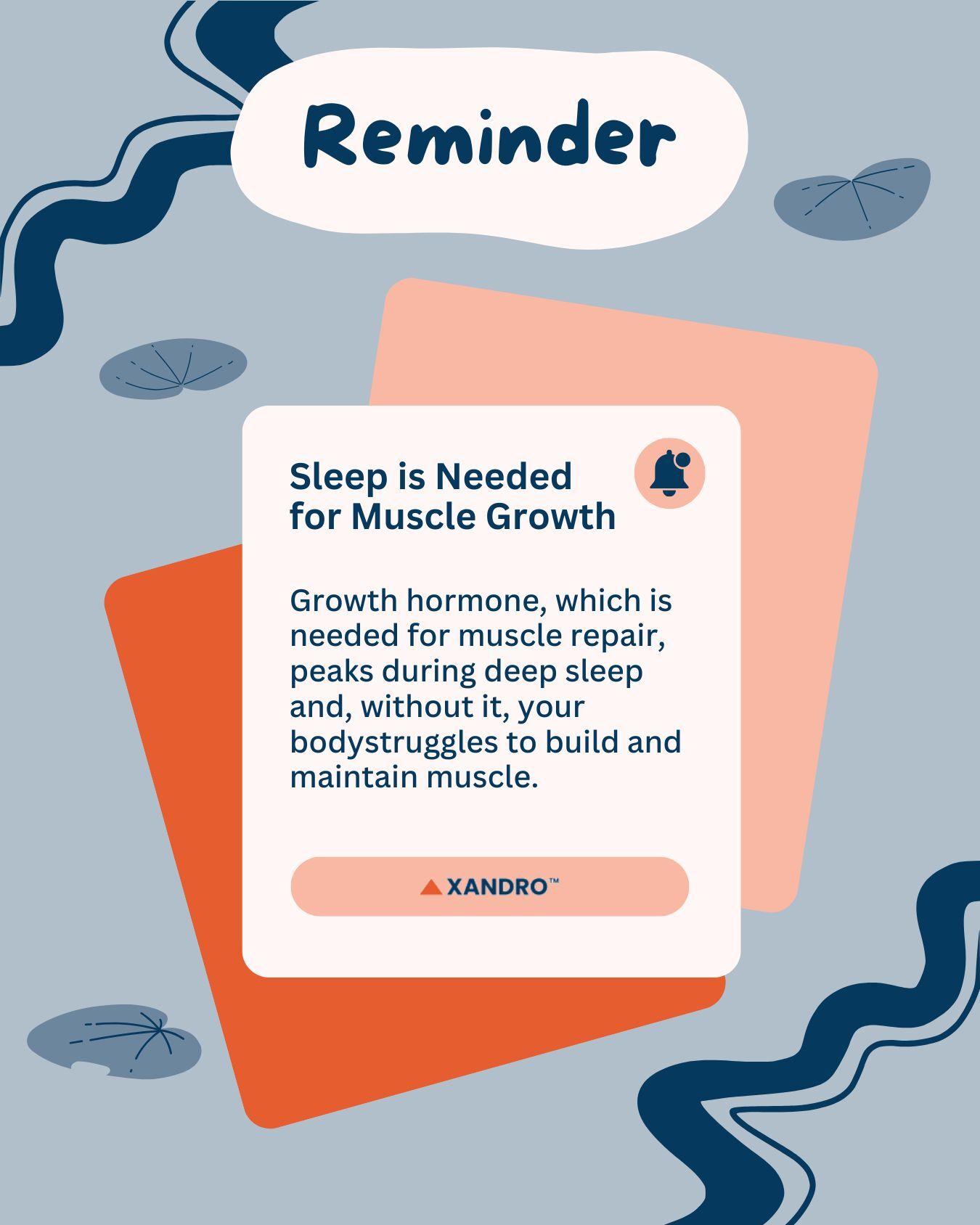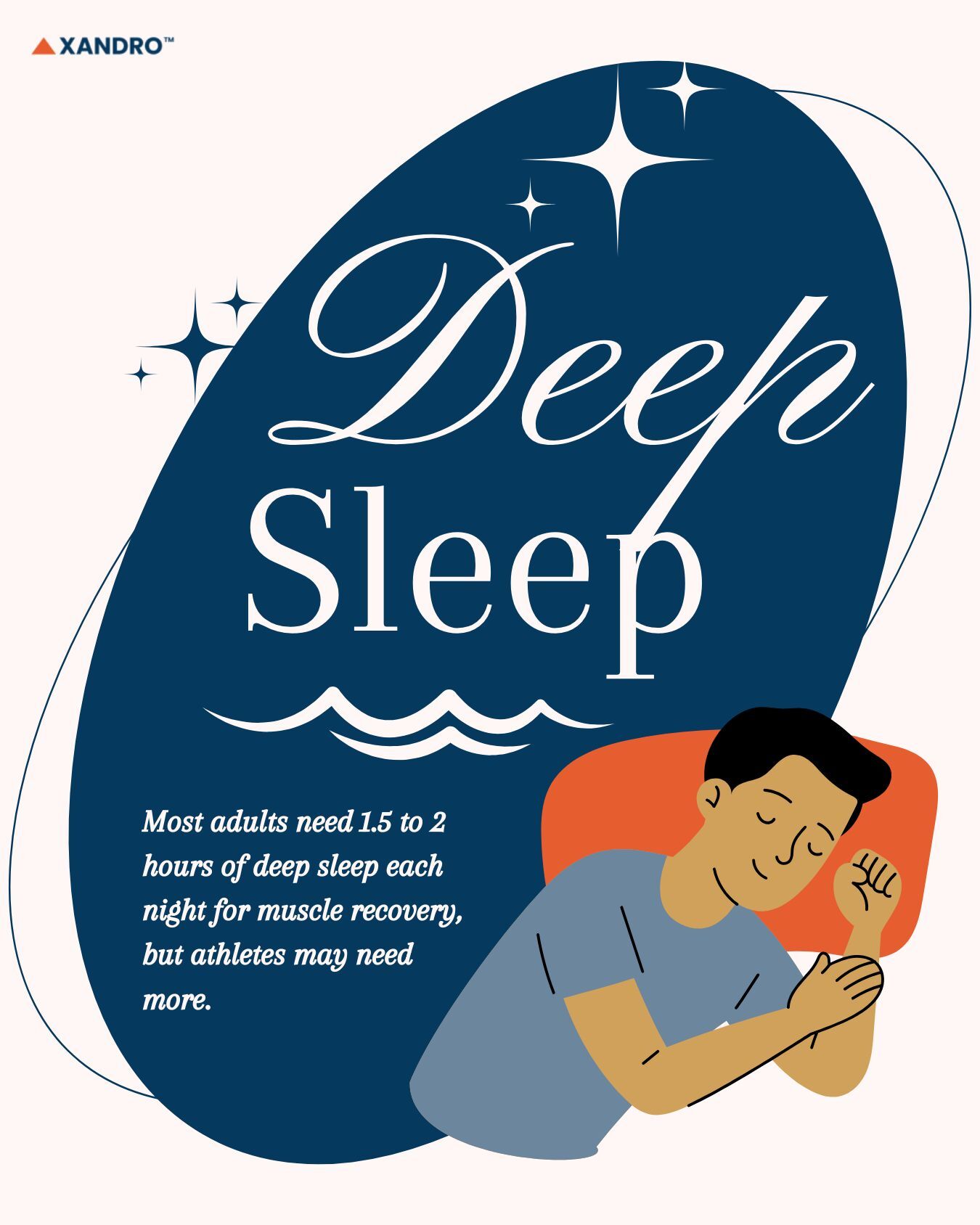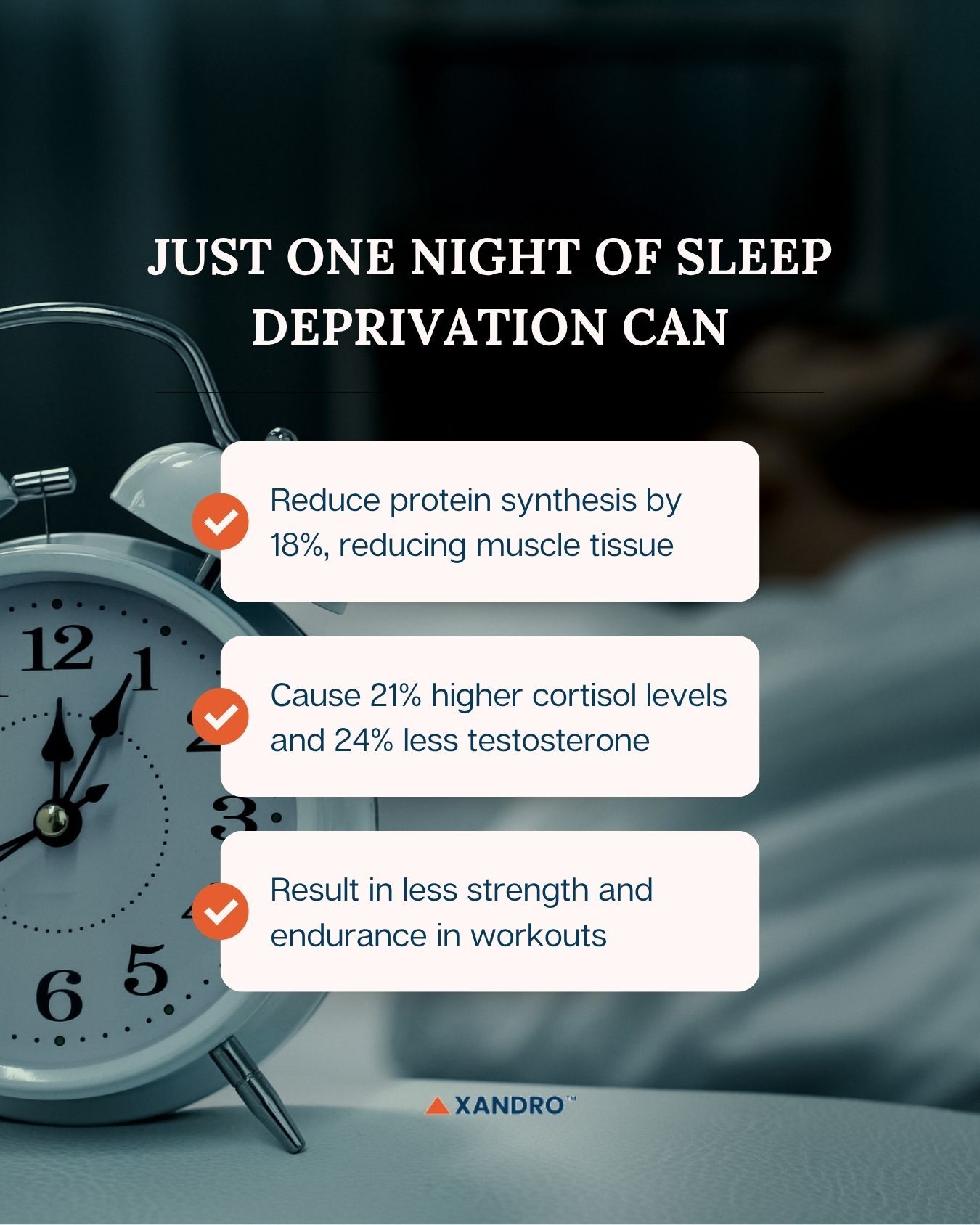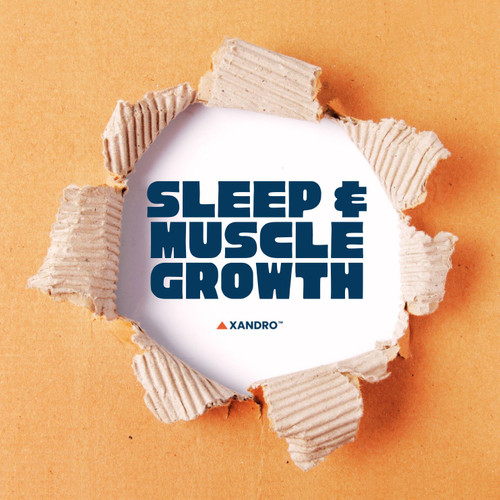Is Sleep Important for Muscle Growth | Xandro Lab
29th Jul 2025
Sleep and Muscle Growth: How Important Is Rest for Recovery & Gains?
You hit the gym hard, eat plenty of protein and follow your training plan, but are you missing a key piece of the muscle-building puzzle?
Many don’t realise that sleep plays an important role in muscle repair and growth. When you sleep, your body releases growth hormones, repairs muscle damage and restores energy, all of which are needed for gains. But does sleep help muscle growth and how much rest do you actually need? Let’s break down the science and answer your biggest questions about muscle building and sleep.
Know what you’re looking for? Jump there now:
- How Much Does Sleep Affect Muscle Growth and Recovery?
- REM Sleep and Muscle Growth: What’s the Connection?
- Can Lack of Sleep Cause Muscle Loss?
- Sleep and Testosterone: How Rest Impacts Muscle Gains
- The Best Time to Sleep for Muscle Growth
How Much Does Sleep Affect Muscle Growth and Recovery?
Sleep plays a major role in muscle growth and recovery. When you lift weights or exercise, you create tiny tears in your muscle fibres and sleep is when your body repairs these micro-tears, making your muscles stronger and bigger. Without enough rest, this repair process slows down, limiting your gains.
A sleep and muscle growth study showed that poor sleep can reduce muscle protein synthesis, the process that builds new muscle, by up to 18 per cent after just one night of no sleep. Over time, chronic sleep deprivation may even lead to muscle loss. On the other hand, quality sleep boosts growth hormone release, replenishes energy stores, and helps muscles recover faster.
How Important Is Sleep for Muscle Growth
Sleep is just as important as diet and training for muscle growth. Sleeping and muscle growth studies confirm that people who get enough deep sleep have more lean muscle mass than those who don’t. Growth hormone, which is important for muscle repair, peaks during deep sleep. Without it, your body struggles to build and maintain muscle.
Even short-term sleep loss can hurt your progress. One study found that sleeping just 5.5 hours per night caused participants to lose muscle instead of fat while dieting. If you want to maximize your gains, prioritizing sleep is non-negotiable.

What Happens to Your Muscles During Sleep?
While you sleep, your body shifts into repair mode. Growth hormone floods your system, helping rebuild damaged muscle fibres. Your muscles also replenish glycogen, their main energy source for workouts.
Deep sleep (slow-wave sleep) is especially important, as this is when most muscle repair happens. Meanwhile, REM sleep supports brain function and coordination, which helps with strength and performance. If you skip sleep, you miss out on these essential recovery processes, leaving your muscles weaker and slower to grow.
Further Reading: All About the Link Between Muscles and Metabolism
REM Sleep and Muscle Growth: What’s the Connection?
REM sleep is when your brain processes memories and emotions, but it also plays a role in muscle recovery. While deep sleep handles most physical repair, REM sleep helps regulate stress hormones like cortisol. High cortisol levels break down muscle, so quality REM sleep helps keep these levels in check.
Studies show that disrupted REM sleep can lead to weaker recovery and slower muscle growth. Athletes who get sufficient REM sleep tend to have better coordination and faster reaction times, which is important for strength training. So, while deep sleep builds muscle, REM sleep protects it by keeping your nervous system and hormones balanced.
How Much Deep Sleep for Muscle Growth?
Deep sleep is where muscle magic happens. This is when your body releases the most growth hormone, repairs muscle tears, and restores energy. Most adults need 1.5–2 hours of deep sleep per night for better recovery, but athletes may need more.
Research shows that missing deep sleep cuts growth hormone production, slowing muscle repair. People who sleep poorly lose more muscle when dieting compared to those who get enough deep sleep. To make sure you get enough deep sleep, avoid late-night workouts, limit alcohol and keep a cool, dark bedroom. Your muscles rebuild strongest when you sink into those slow, restorative waves of deep sleep.

Can Lack of Sleep Cause Muscle Loss?
A lack of sleep can directly lead to muscle loss. When you don't get enough rest, your body struggles to repair and rebuild muscle tissue effectively. In terms of lack of sleep and muscle growth, sleep deprivation reduces growth hormone production, which is essential for muscle recovery and growth. It also increases cortisol, a stress hormone that breaks down muscle for energy.
Further Reading: Learn About the Importance of Muscle Mass for Longevity
Sleep Deprivation and Muscle Recovery: What Studies Show
Research confirms that poor sleep severely impacts muscle recovery. One study found that just one night of total sleep deprivation reduced muscle protein synthesis by 18 per cent. This means your body becomes less efficient at turning protein into new muscle tissue.
It was also found that sleep-deprived individuals had:
- 21 per cent higher cortisol levels
- 24 per cent lower testosterone
- Less strength and endurance in workouts
Even short-term sleep loss can disrupt recovery. A study on mice found that sleep deprivation after intense exercise slowed muscle repair. For athletes and gym-goers, this means slower progress and higher injury risk. The science is clear: if you want to build and maintain muscle, making sure you get enough sleep is non-negotiable.

Sleep and Testosterone: How Rest Impacts Muscle Gains
Sleep directly controls testosterone levels, one of your body's most powerful muscle-building hormones. Research shows that men who sleep 5 hours or less per night have significantly lower testosterone than those getting 7–9 hours. One study found just one week of poor sleep reduced testosterone by up to 15 per cent, equivalent to ageing 10–15 years.
During deep sleep, your body releases pulses of testosterone that help repair muscle tissue and trigger growth. Miss this recovery window and you lose both testosterone and its muscle-building benefits. Sleep deprivation also increases cortisol, which further suppresses testosterone production.
This means that athletes who focus on sleep maintain higher testosterone levels, recover faster and build more muscle than those cutting corners on rest.
The Best Time to Sleep for Muscle Growth
Your body follows a natural circadian rhythm that improves muscle recovery when you sleep at the right time. Research hasn’t found an exact time that boosts muscle growth or even deep sleep, the phase when growth hormone peaks (the hormone needed for repairing muscle tissue and stimulating growth). Instead, focus on getting enough sleep each night and building a sleep schedule. You can use a sleep calculator to help with this.
How Many Hours of Sleep Do You Need for Muscle Growth
Most adults need 7–9 hours of sleep for best muscle growth results, but athletes and active individuals often require more. Studies show that sleeping less than 6 hours reduces protein synthesis by up to 18 per cent, slowing muscle repair.
- 5.5 hours or less: Leads to muscle loss, even with proper diet and training
- 7–8 hours: Maintains muscle mass and supports recovery
- 9 hours: Boosts growth hormone release for athletes in heavy training
Your exact needs depend on activity level, age and genetics, but if you train intensely, try to reach the higher end of this range.
Can Naps Help with Muscle Recovery?
Short naps (20–30 minutes) can boost recovery when you don’t get enough nighttime sleep. A well-timed nap helps lower cortisol, the stress hormone that breaks down muscle, while providing extra rest for repair.
Just note that naps can’t replace deep sleep. Long or late naps may disrupt nighttime rest, reducing growth hormone secretion. For best results:
- Nap early in the afternoon (1–3pm)
- Keep naps for muscle growth under 30 minutes
- Focus on getting full nights of sleep first
Naps work best as a supplement, not a substitute, for quality nighttime recovery.
Further Reading: Got Muscle Pain? Here are the Top Vitamins and Minerals to Help.
End Note
So, is sleep important for muscle growth?
As you can see, sleep is just as important as diet and training when it comes to building muscle. Without enough quality rest, your body can’t properly recover, repair muscle tissue, or boost growth hormone release.
Whether you’re bulking up or maintaining strength, focusing on sleep and recovery makes sure your hard work in the gym pays off.
So, if you’re serious about gains, don’t just focus on lifting heavy! Make sleep a non-negotiable part of your muscle-building strategy. Need help getting more sleep? You might be low in certain vitamins and minerals, like magnesium. Magnesium helps relax your body, can improve sleep quality and reduce the time it takes to fall asleep. Try Xandro Magnesium Glycinate 500g if your levels suggest you need a booster!
Tags:
